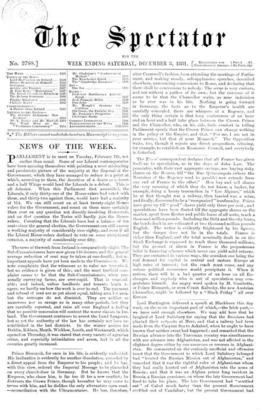Prince Bismarck, for once in his life, is evidently undecided.
His inclination is evidently for another dissolution, preceded by a direct appeal from the Emperor to his people ; and be bas, with this view, ordered the Imperial Message to be placarded on every church-door in Germany. But he knows that the Emperor, who chose him, is far too ill for a new conflict ; he distrusts the Crown Prince, though hereafter he may come to terms with him, and he dislikes the only alternative open road, —reconciliation with the Ultramontanes. He has, therefore,
after Cromwell's fashion, been attending the meetings of Parlia- ment, and making moody, self-applausiv a speeches, described elsewhere, announcing concessions to Rome, and declaring that there shall be concessions to nobody. The scene is very curious, and not without a pathos of its own ; but the outcome of it seems to be that the Chancellor waits, as near indecision as he ever was in his life. Nothing is going forward in Germany, the facts as to the Emperor's health are carefully concealed, there are whispers of a Regency, and the only thing certain is that long conferences of an hour and an hour and a half take place between the Crown Prince and the Chancellor, who, on his side, finds comfort in telling Parliament openly that the Crown Prince can change nothing in the policy of the Empire, and that, " For me, I am not in your service, but that of your Monarch." The Opposition waits, too, though it rejects any direct proposition, refusing, for example, to establish an Economic Council, and everybody is disturbed.






































